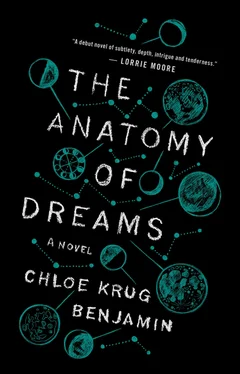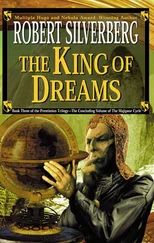“Can you explain it to me?” I asked. “Your theory?”
“Didn’t Gabriel?”
Keller walked back to the desk and rummaged around inside the doggy bag. He came out with an apple, a compact and shiny Red Delicious, which he juggled absentmindedly in one hand.
“He thought it’d be better for me to learn it from you,” I said.
A white lie, but I didn’t want to tell Keller that I’d been totally unable to decipher Gabe’s explanation. I hoped he wouldn’t follow up with Gabe to ask—and this is what I was thinking about, whether or not Keller would find out how clueless I really was, when he raised his left arm and sent the apple hurtling directly for my head.
I made a pathetic gasping noise and ducked to the right; the apple sloped to the ground, hitting the floor of the hallway with a dull thud, and tumbled a few more feet before coming to a stop.
“What was that?” I asked, turning to look at the apple and then back at Keller, who was watching me with an utter lack of surprise.
“How do you feel?” he asked.
“I feel—what?” I sputtered. “I feel freaked.”
“Your heart rate is up?”
“Of course.”
“You’re sweating?”
“A little.”
“And you’re angry with me.”
“You almost hit me.”
“But I didn’t,” said Keller pleasantly. “So why do you feel the way you do?”
I stared at him.
“Because you could have,” I said. “You could have hit me.”
“Ah. Precisely.”
He walked out of the room to retrieve the apple, then brought it back inside, rubbing it on his shirt. It had caved in on one side.
“Forgive me,” he said. “I knew you’d duck. I hoped you would, at least. But I was trying to make a point. When I threw this apple at you, I knew there were several likely outcomes. What were they?”
“You’d hit me,” I said. “Or I’d duck before you could. Or the apple would miss me entirely.”
“Good. The possibilities, of course, are infinite—I could have twisted my arm in swinging, sending the apple straight for one of these windows; Gabriel could have chosen to walk down the hall at that moment, in which case he would have been hit instead. But I chose to put my faith in probability. The apple would hit you, or it wouldn’t. I’m pleased to say it didn’t. But you’re reacting as though it did. Not because it hit you—but because it could have.”
“Right,” I said. I was still wary, but my heart rate was beginning to steady.
“At the moment of decision,” said Keller, “at the moment of action, an infinite array of possibilities are conceived in the mind—alternate but parallel psychological universes, each with its own set of outcomes and implications. Only one of these possibilities will be actualized. But what happens to the rest? If they folded neatly into submission, disappeared into the dust from whence they came, you would be, so to speak, single-minded. You would have felt no anxious residue, no fear or anger, when the apple was no longer a threat. And yet you did feel the threat of the outcomes that were not realized; indeed, you seemed to feel that threat more acutely than you did any sense of relief that the apple, as luck would have it, sailed right over your head.”
“And those are your simultaneous potentialities?”
A part of me thought it made perfect sense; the other part wondered, with a flailing sense of alarm, just what I’d gotten myself into.
“Correct,” said Keller. “I believe that these potential experiences are logged in the brain along with the actual one, that the mind processes potentialities and actualities simultaneously and that, therefore, an imagined nonevent—being hit by my apple, let’s say—has as much cognitive power as the actual event.”
“But wouldn’t that be too much for our brains to handle at once?” I asked. “The possibilities would be infinite. How could we process all of them?”
“You’re quite right. Thankfully, the brain is selective. We know that certain actual memories are encoded and stored long-term while others are discarded. This is true, too, for potential memories.”
“But for memories to be stored, they have to be processed,” I said. “How can they be processed if they’re never experienced?”
“Aren’t they?”
“Subconsciously, maybe.” I shook my head. “But I thought you were working on sleep. What does all this have to do with dreams?”
“I hope it has a great deal to do with dreams,” said Keller with mock solemnity. “We’ll be in a rather tight spot if it doesn’t. We already know that sleep—REM sleep in particular—plays an important role in long-term memory formation and mental health. If simultaneous potentialities are sufficiently processed and resolved in REM sleep, we find ourselves better able to focus on the reality of waking life. But what happens to patients whose sleep isn’t normative and whose emotional processes are, therefore, disrupted? Patients like the ones I see, who suffer from REM disorders?”
“They can’t resolve them,” I guessed. “The simultaneous potentialities aren’t processed. They keep looping, and the dreamers continue to act them out, these things they’re afraid of—things that haven’t happened yet, or things that happened a long time ago. Things that aren’t real now—at least, not outside of their dreams.”
I was babbling, spitting his words back at him less articulately than I’d been able to do in high school.
“It’s a start,” Keller said.
Through the open windows, I heard the crunch of shells that signaled Gabe’s arrival. The two orbs of his headlights grew brighter, spilling into the library, before the car came to a halt and the power was turned off.
“That’ll be Gabriel,” said Keller, cocking his head at the noise. He turned back to me and smiled, but I could see he was distracted; it was as if he’d just remembered his unpacked suitcases, dinner to be made, whatever ends had to be tidied up after the previous assistant’s departure.
“Mr. Keller?” I asked.
He raised his eyebrows.
“The letter,” I said. “Who were you writing to?”
If I had crossed some line, he didn’t blink.
“My thesis adviser,” he said. “Meredith.”
As I lay in bed that night, tossing in my UC-Berkeley boxers, his ideas seemed to me frightening and revolutionary. And they were, I discovered—though PNP was revolutionary less for its novelty than for its return to so-called archaic notions of the mind as murky, spiritual terrain, terrain whose geography was better understood by folklore and poetry than it was by pharmacology. In hindsight, I can see that Keller’s scholarly path was always one of upstream travel: the absorption of modern-day psychology into medicine and the hard sciences stranded him in murky terrain of his own, and though he had made use of his marginalization—there seemed to be a continual stream of people swimming to his rock, shaking the water off their backs, and clambering up to admire the view from the island—I know now that he worked always in fear of being delegitimized.
If I had known then what I do now, perhaps I would have been able to see Keller as he was: an aging, proud, and anxious man, unwavering in his convictions, persuasive in speech, but prone to paranoia and hermeticism. It should come as no surprise that someone so convinced of the mystery and idiosyncratic depth of the human mind should be self-isolating. But I could not help but see him, through the years, as a kind of martyr: brilliant, exiled, and lonely as a god.
10. MADISON, WISCONSIN, 2004
As October gave way to the stark skies of November, its spindly, barren trees, I was surprised to find a cream envelope beneath the porch door of our house: perfectly square, licked shut, with a calligraphic scrawl— G + S —in black ink. I opened it in the kitchen while Gabe slept off the late study we’d monitored the night before.
Читать дальше












